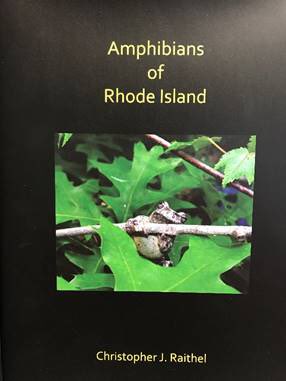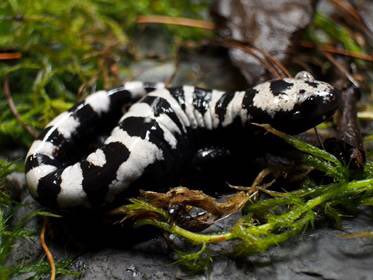New
guide to Rhode Island slimy critters
 The Department of Environmental Management (DEM) is proud to announce the
publication of Amphibians of Rhode Island, an authoritative book spotlighting
the 18 species of amphibians that are native to Rhode Island.
The Department of Environmental Management (DEM) is proud to announce the
publication of Amphibians of Rhode Island, an authoritative book spotlighting
the 18 species of amphibians that are native to Rhode Island. Written by longtime DEM natural heritage biologist Christopher Raithel, the book provides meticulous accounts of the state's native frogs, toads, and salamanders and their respective habitats, and includes crisp, vivid photography depicting the amphibians' multiple life stages.
More
than just a field guide, it combines an exhaustive search of the historical
record and four decades of Raithel's intense personal study to present complete
information on the statewide distribution, demography, seasonal movement,
reproduction and development, research needs, and conservation status of each
species.
One chapter is devoted entirely to conservation, detailing the threats faced by amphibians and the actions needed to safeguard them.
One chapter is devoted entirely to conservation, detailing the threats faced by amphibians and the actions needed to safeguard them.
"Amphibians of Rhode Island is an impressive and comprehensive account of our state's native amphibians that sets the stage for conservation for decades into the future," said DEM Director Janet Coit. "Chris Raithel is an expert across many species and his new book will be an enormous asset in Rhode Island and regionally."
Raithel
enjoyed a distinguished, 40-year career in DEM's Division of Fish and Wildlife
before retiring in 2018.
He began his work by finding and cataloging plant and animal diversity across Rhode Island and assessing the conservation status of less common species.
 While at DEM, he served as the state endangered species
biologist, herpetologist, and non-game bird biologist. A major contributor to
the state's first-ever RI Wildlife Action Plan and its 2015 update, Raithel
prepared numerous species accounts for the more than 450 Species of Greatest
Conservation Need.
While at DEM, he served as the state endangered species
biologist, herpetologist, and non-game bird biologist. A major contributor to
the state's first-ever RI Wildlife Action Plan and its 2015 update, Raithel
prepared numerous species accounts for the more than 450 Species of Greatest
Conservation Need.
He has personally documented individual turtles and their movements and life history for over 30 years.
He is a nationally recognized expert in the management and monitoring of the American burying beetle.
He began his work by finding and cataloging plant and animal diversity across Rhode Island and assessing the conservation status of less common species.
 While at DEM, he served as the state endangered species
biologist, herpetologist, and non-game bird biologist. A major contributor to
the state's first-ever RI Wildlife Action Plan and its 2015 update, Raithel
prepared numerous species accounts for the more than 450 Species of Greatest
Conservation Need.
While at DEM, he served as the state endangered species
biologist, herpetologist, and non-game bird biologist. A major contributor to
the state's first-ever RI Wildlife Action Plan and its 2015 update, Raithel
prepared numerous species accounts for the more than 450 Species of Greatest
Conservation Need. He has personally documented individual turtles and their movements and life history for over 30 years.
He is a nationally recognized expert in the management and monitoring of the American burying beetle.
An
outstanding resource for scientists, students, and nature lovers alike, the
book would make an excellent addition to a school or home library. Published by
DEM's Division of Fish and Wildlife, Amphibians of Rhode Island is being sold
for $20 including tax.
It may be purchased in person at the DEM Office of Boat Registration and Licensing in Providence by cash, check, money order, or credit card (credit card requires an extra fee) and at the Division of Fish and Wildlife Field Headquarters in West Kingston, by check or money order only.
The book also may be purchased by mail using the order form found at: http://www.dem.ri.gov/bookorder.
It may be purchased in person at the DEM Office of Boat Registration and Licensing in Providence by cash, check, money order, or credit card (credit card requires an extra fee) and at the Division of Fish and Wildlife Field Headquarters in West Kingston, by check or money order only.
The book also may be purchased by mail using the order form found at: http://www.dem.ri.gov/bookorder.
The
US Fish and Wildlife Service and State Wildlife Grants Program provided funding
for the book. All revenue generated by its sale will be directed toward
wildlife conservation via the Rhode Island Division of Fish and Wildlife.
For
more information on DEM programs and services, visit www.dem.ri.gov. Follow DEM
on Twitter (@RhodeIslandDEM) or Facebook at www.facebook.com/RhodeIslandDEM for
other timely updates.
Related links